Braddock (Miami) running back completes seemingly impossible dream of getting back on field after losing most of his sight at age 9.
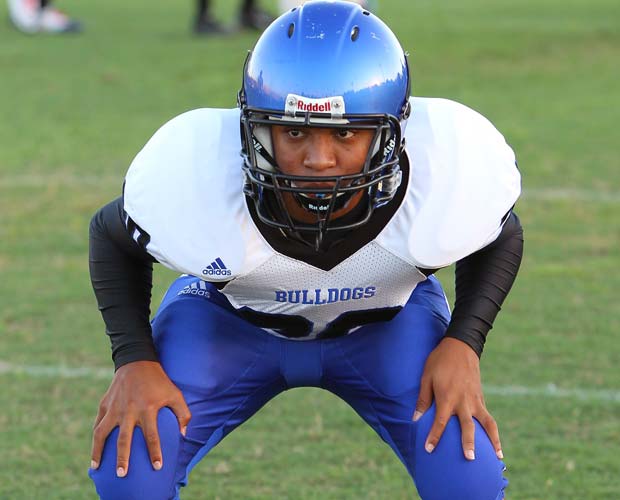
Braddock High junior Davonte Pollard was diagnosed with Retinitis pigmentosa, a degenerative eye disease that robbed him of most of his sight, when he was 9 years old. After a seven-year stint away from athletics, the 16-year-old made the football team at Braddock in the summer and has been an inspiration not only to teammates and fellow students, but the entire Miami community.
Photo by Stuart Browning
Since losing most of his sight seven years ago,
Braddock (Miami) junior
Davonte Pollard said his other senses have intensified enormously.
Through touch, the 16-year-old can read - "I learned Braille within two months," he said proudly – and make music. He plays the guitar and piano.
His voice is loud and clear – he sings and raps and one day hopes to be the next Stevie Wonder or Ray Charles. He can also say the name of the inherited, degenerative eye disease that took his sight — "
Retinitis pigmentosa" — with perfect diction and pronunciation.
Pollard's greatest sense, he says, is hearing.
"I can be on one side of the gym and hear what someone is whispering on the other," he said.
But Pollard thought his ears were playing tricks Sept. 27 when he heard Braddock football coach Frank Rojas yelling his name on the sideline.
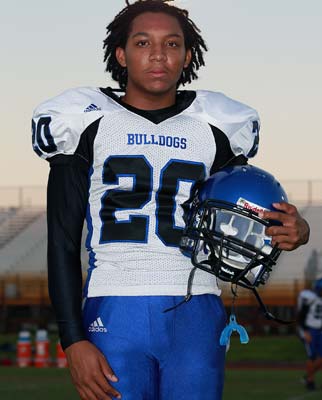
Davonte Pollard, Braddock
Photo by Stuart Browning
It was the final seconds of the Bulldogs' homecoming game with archrival Coral Park and 5,000 fans filled the stands.
"I was stretching and the next thing I know I heard ‘Davonte is going in,'" Pollard said.
At that point, Pollard thought it was some sort of dream. He recalled his stream of consciousness: "No. Davonte who? Nah, nah, nah, it can't be me. He's probably calling someone in the stands."
This was no dream. Pollard, a 5-foot-8, 160-pound legally blind running back, was going into a varsity football game to carry the ball against 11 fully sighted, angry Coral Park players who were trailing 35-20.
But this is exactly what Pollard wanted when he came to Rojas last spring, when he asked if he could come out for the team. Pollard, a vivacious, popular kid, knew numerous players on the squad and was always around the football program.
He was a football star as a youth – "they called me Deion Sanders because I was a lock-down corner," Pollard said with a giant smile – so he thought why not? Why couldn't I play?
So, he asked Rojas, a 22-year coaching veteran with an iron fist and heart of gold who has kept a once-healthy and flourishing football program afloat to give kids an avenue out of the inner city, for a spot on the roster. For a chance to rub shoulders with the big boys and rekindle a dream he had back when his sight was perfect and his heroes were larger than life: Sanders, Walter Payton, Barry Sanders, Peyton Manning and Michael Vick.
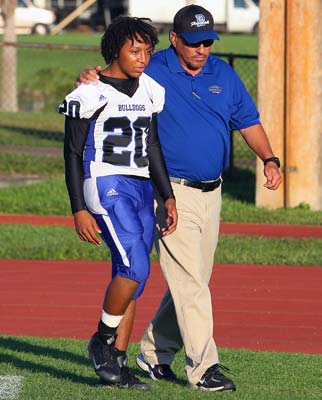
Braddock head coach Frank Rojas walks with Pollard
before Saturday night's game against Varela in Florida.
Photo by Stuart Browning
Rojas thought why not? He liked Pollard's charm and spirit and gumption.
"He's a great kid with a lot of character," Rojas said. "He is a character."
He told Pollard if he filled out the paperwork, got clearance from medical people and his parents, by all means, he could join the team.
"Frankly," Rojas admitted. "I didn't think he'd follow through. But he called my bluff."
Indeed, three weeks later Pollard returned with papers signed and sealed. He passed every physical exam as well.
"I double and tripled checked everything," Rojas said. "Honestly, I never thought it would all get cleared."
Said Pollard: "I think I shocked him a little. I think I shocked a lot of people."
Like his parents, Joyce and Joseph.
"We never have tried to put any limitations on Davonte and back everything he wants to do," Joseph said. "At the same time, this was football. I think we were really afraid."
His friends and future teammates were much more blunt. Especially when he told Rojas he wanted to play running back.
"I thought originally we'd put him on the defensive line – let him clog up the middle or something, but he insisted he wanted to be a running back," Rojas said. "I said, ‘All right, if this is what you want to do, we'll do it.'"
Said Pollard: "Everyone thought I was crazy. They'd always tell me: ‘Boy, are you losing your mind? I would never come out here and play football and be blind. That's like running the ball with your eyes closed."
Video by Jason Alpert/Edited by Ryan Escobar
{PAGEBREAK}
Red Flag
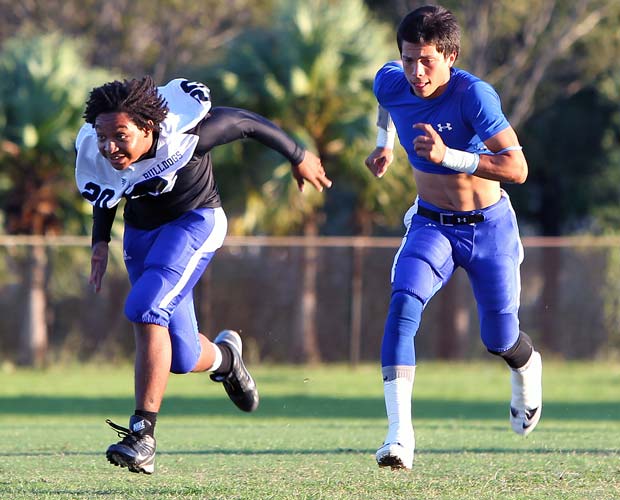
Pollard warms up by running with teammate Jamie Jarquin before last Saturday night's game.
Photo by Stuart Browning
Pollard ran with his eyes wide as a youngster, playing for his dad on the Liberty City Warriors in Pop Warner leagues. The sixth of seven children, he started playing tackle football at the age of 4. He wore Deion Sanders' number 20 and was a flash on both sides of the ball.
"He was even better in basketball," said Joseph, who coached both sports. "He was a great point guard. When he was 6, he started on a 9-and-under team. He could dribble and shoot and pass. We have all sorts of trophies and pictures still."
His greatest asset on the court, cruelly enough, was his vision. He saw the entire court.
"That's when we started to figure out there was a problem," Joseph said. "He couldn't find passes. People would throw him the ball and he wouldn't see it coming. It raised a red flag."
He wore goggles at first. But they didn't help. Glasses didn't either.
His peripheral vision was fading. He could see OK in front of him, but even that became blurred and discolored.
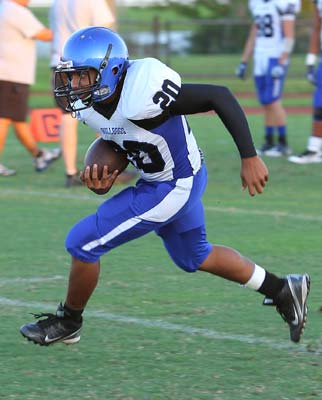
Pollard carries during warm-ups last Saturday.
Photo by Stuart Browning
"When doctors confirmed the worst and made the diagnosis – that he would lose his vision permanently – Pollard was in complete denial. Then again, he was only 9.
"I was shocked," he said. "I couldn't believe it. I kept telling the doctor, ‘You're lying, you're lying.' When I finally believed it, it made me sad and I started to cry."
Joseph said he still cries. Partially because he wonders what might have been for his son, but moreso because of his son's resilience and fearlessness.
"He doesn't like pity and never has," Joseph said. "He's never wanted to be treated any differently than anyone. When he goes to the kitchen, he finds his own glass. He puts away his own clothes. He's a strong kid. He took it better than any of us did. He never missed a beat with it. He accepted it and has strived to be the best person he can."
Pollard, always a good student, said his anger and sadness turned suddenly.
"I remember thinking, 'I'm no crybaby,'" he said. "I got over it. I thought enough is enough."
Instead of dreaming about being the next great point guard or defensive back, he dreamed about being the next great musician.
"If they can play the piano and sing and be blind, then I can do it too," he said.
After seven years of pursuing those dreams, his pull back to the athletic field was too great. That's why he approached Rojas.
"I wanted to see if I could play football again and come back to my old dream," he said. "I thought about it. I can still see colors and figures. I can still play running back. As long as I don't go out for passes, as long as they're just handoffs, I can still do it."
And Rojas was about to give him that shot in a game.
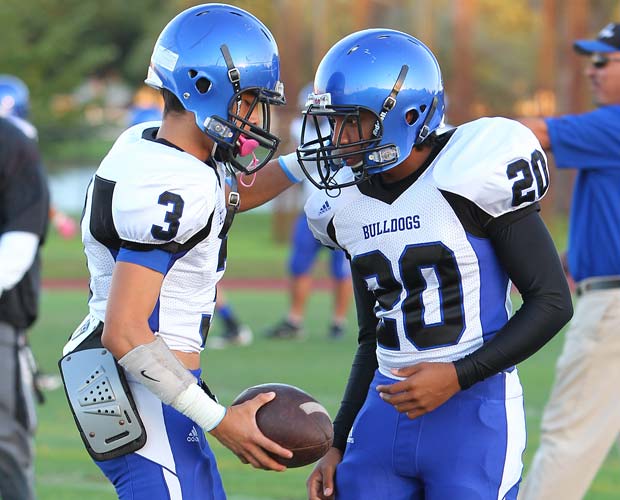
Teammate Jamie Jarquin instructs Pollard before last Saturday night's game.
Photo by Stuart Browning
{PAGEBREAK}
Left 47 Stretch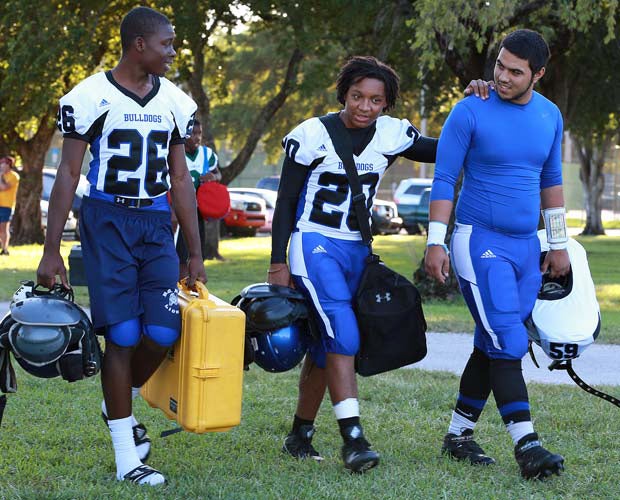
Pollard walks with teammates while preparing for Saturday night's game.
Photo by Stuart Browning
First Pollard had to prove himself in practice, which wasn't easy since he hadn't trained seriously for years. Rojas and Pollard's teammates didn't take it easy on him.
"I was very sore," Pollard said. "Getting in the weight room and then going through boot camp was really hard. Not being active for seven years straight does something to you."
But going through it earned him the respect of his teammates, like quarterback and safety
Jamie Jarquin.
"When I first heard he was coming out to practice, I thought he was (joking)," he said. "But then we saw him out here and seeing him work out and doing what he had to do just to play, made me feel good about him. He's trying to do something, better himself."
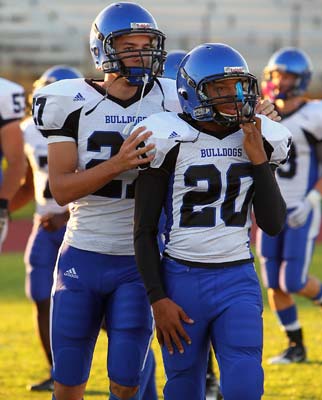
Teammate Frank Ramirez guides Pollard in warm-ups.
Photo by Stuart Browning
Jarquin had a special appreciation for Pollard. He has a special needs brother at home and knows the extra effort Pollard needs to make to thrive in the real world. Besides all that, Jarquin said, "(Pollard) is a good kid. He stays out of trouble, goes to school, does the right things. You don't see a lot of kids like that."
That made him popular among teammates, who unconditionally guided him through drills and training and practice.
"Every day is a learning lesson with Davonte out there," Rojas said. "He gives all of us a unique perspective."
Said junior
Evans Othelot: "(He) makes me appreciate more that I have the ability to play the game."
So, when it was Pollard's shot to finally get in the game, when Rojas finally called his name with 2 seconds left, his teammates went ballistic. So did Pollard.
"My vision was clear all game until he called my name," Pollard said. "I was in shock. My eyes freaked out. Everything was completely blurred. When I got in the huddle, it was sort of like ‘Where am I?'"
Pollard remembers hearing his teammates in the huddle "Block for him. … If he gets hurt, I'm hurting you."
The play that Pollard had practiced over and over again since the spring was "Left 47 Stretch" - a simple handoff that looks like a sweep, but then is supposed to be cut upfield.
Just as practiced, the handoff was clean. But just as he was going to plant and turn it up … POW!
Pollard got crunched by a blitzing safety for a 2-yard loss to end the game. He didn't fumble and the Bulldogs won 35-20 – their only win in eight starts – before he was mobbed by teammates, coaches, family and students.
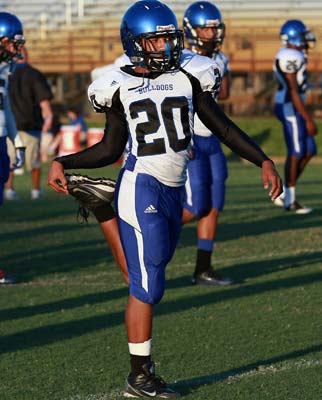
Pollard stretches before Saturday night's game.
Photo by Stuart Browning
It was perhaps the most celebrated 2-yard loss in the history of high school football. His dream of getting back on to the playing field was finally realized.
"I didn't feel anything," Pollard said of the tackle. "It felt like a feather."
Said Jarquin: "It was an intense moment. We knew this was a lifetime dream for him to get back out there. To see him in a game was very special. It was special for all of us."
Pollard isn't done though, he says.
"I want more," he said. "Coach (Rojas) is going to call on me again. I know it."
If not this season, then perhaps next. Pollard said he'll go out for the squad again in 2013. After that, he plans to study economics, finance and music at Florida State. He hopes to earn a Master's degree.
Asked if ever wonders why he sustained the disease, which skips generations, Pollard said: "Not really. I always tell people I'm the lucky one. Because if it wasn't my eyes, then maybe it could have been my ears or speech or legs.
"Now I believe I could do way more than I'm doing if I just put my mind to it. Hopefully I can help motivate others."
Beyond the X is a monthly feature that celebrates high school sports. You can contact Mitch Stephens by email at mstephens@maxpreps.com. Follow him on Twitter at @MitchMashMax.